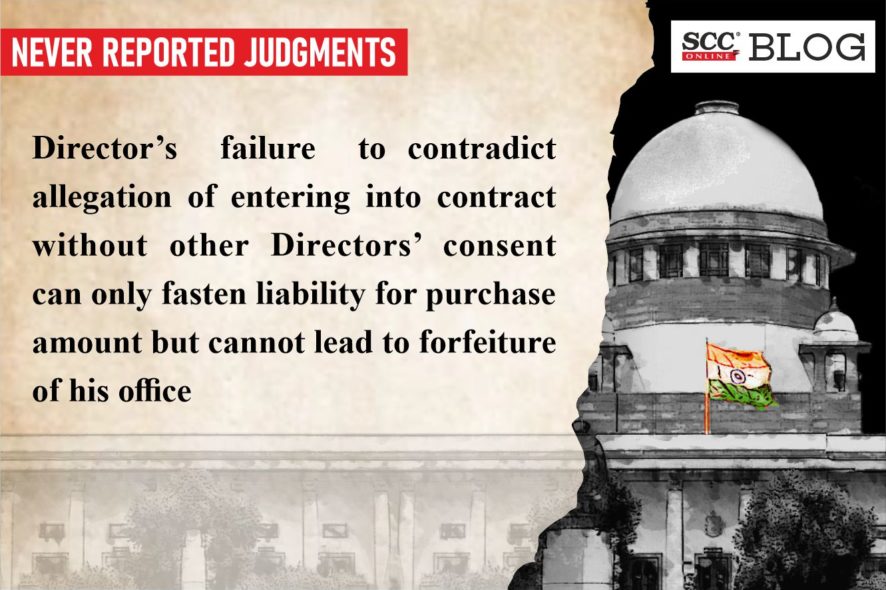Supreme Court: In a case where the appellant challenged the forfeiture of his office of Director for allegedly entering into a contract with the Company in contravention of S. 86-F of the Companies Act, 1913 and filed an appeal before this Court, the 6-judges Bench of Harilal Kania, C.J., Fazl Ali, Patanjali Sastri, Mehr Chand Mahajan, B.K. Mukherjea and S.R. Das, JJ., held that the failure of director to contradict the statement in Company’s letter leveling the allegation of contract of purchase from the Company without the consent of the other Directors as per Section 86-F of the Companies Act, 1913 (the Act), would only fasten liability for the purchase amount on the Director but cannot lead to the conclusion that he entered into the alleged contract entailing forfeiture of his office of Director under Section 86-I(h) of the Act.
In the present case, Respondent 1, Dhanraj Mills Ltd. (the Company) was incorporated as a joint stock company under the Act. Article 96 of the articles of association of Company provided that the appellant, who was the promoter of the Company, shall during his lifetime be a Director and Chairman of the Board and shall not be liable to retire by rotation as per Article 110. Respondents 2 to 5 were the other Directors of the Company. Ramgopal Ganpatrai & Sons Ltd., which is controlled by Respondent 2, were and are the Managing Agents of the Company.
On 15-10-1946, the Company wrote a letter to the appellant, enclosing a copy of letter written by Harprasad Gupta, one of the shareholders of the Company, and intimating that, while going through the records of the Company, it was found that the appellant had without the consent of the other Directors, entered into contracts for the purchase of goods with the Company and had in the result ipso facto ceased to be a Director under Section 86-I(h) of the Act.
The appellant contended that he had not entered into any contract for the purchase of goods referred to in the Company’s letter and demanded inspection of the entries in the books of the Company. He also contended that the Company’s Managing Agents as well as Harprasad Gupta and the Directors had full knowledge of all facts and had not raised any objection to the appellant continuing as a Director. On 4-11-1946, the Company offered inspection of the relevant entries. After the inspection, the solicitors of the appellant contended that the purchases had been made by one D, personal secretary to the appellant in his personal capacity and not by him. But, even after the inspection, the Company maintained its stand and divested the appellant as a Director. Therefore, the appellant filed the suit against the Company and the four other Directors for a declaration that the exclusion of the appellant from the Board of Directors was illegal.
On the evidence, oral and documentary, the trial Judge concluded that the purchases were entered into by D on his own account and that the appellant had not entered into any contract for purchase of any goods with the Company. Thus, passed a decree in favour of the appellant. But the appeal court reversed the judgment and dismissed the appellant’s suit. The appellant then appealed before the Supreme Court.
Findings and Analysis
- It is not disputed that of all the contemporaneous documents, the gate pass is of the highest importance in connection with the purchase transaction but without oral evidence to supplement the gate pass, it cannot be established that the goods were purchased by or on behalf of the appellant. The other documents which were admittedly prepared from this gate pass can have no greater or independent evidential value. Moreover, the inference from the gate pass that as the goods were being carried by the sepoy of the appellant, he must be the person to whom the goods were delivered, cannot be considered reasonable to establish that the appellant was the purchaser.
- Though it was easy enough for the appellant to instruct his attorney to reply to the Company’s letter denying that he had never entered into any such contract. But the appellant should have at the same time stated that the purchases had been made by D. Even in these circumstances, no point can be made against the appellant because of his omission to state that the purchases had been made by D.
- The appeal court was in error and their appreciation of the evidence of the two witnesses, namely, Edwards and Gune for the purchase transaction cannot be accepted as sound as the appeal court did not go into their evidence for the purchase transaction and did not permit the counsel for the appellant to do so.
The Court held that the Company had failed to discharge the onus that was undoubtedly on it and failure of Director to contradict statement in Company’s letter levelling the allegation of contract of purchase of goods from the Company without the consent of the other Directors, would, if at all, only fasten liability amount on the Director but cannot lead to the conclusion that he entered into the alleged contract under Section 86-F of the Act, entailing forfeiture of his directorship under Section 86-I(h) of the Act. Thus, the judgment and decree of the appeal court was set aside, and decree of the trial court was restored.
[Dhanrajgir Raja Narsingirji v. Dhanraj Mills Limited, 1950 SCC 69]







